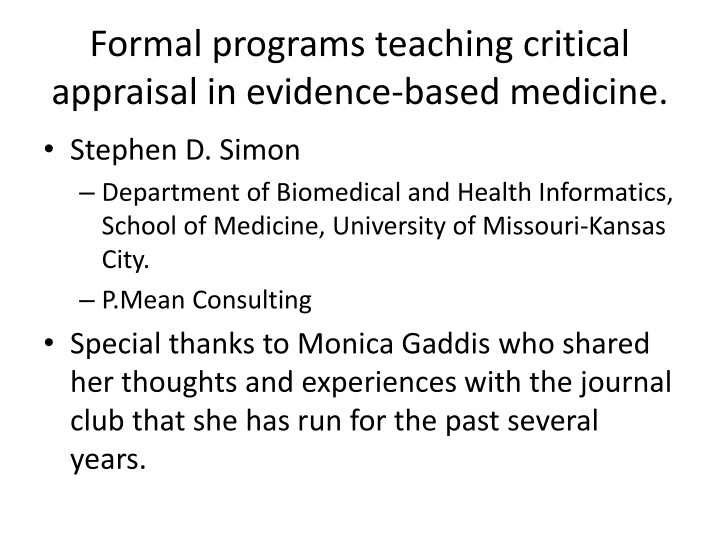
Teaching Critical Appraisal in Evidence-Based Medicine
Learn about formal programs teaching critical appraisal in evidence-based medicine, focusing on research hypothesis development, research design, interpretation of data, and valuable lessons from experienced colleagues.
Download Presentation

Please find below an Image/Link to download the presentation.
The content on the website is provided AS IS for your information and personal use only. It may not be sold, licensed, or shared on other websites without obtaining consent from the author. If you encounter any issues during the download, it is possible that the publisher has removed the file from their server.
You are allowed to download the files provided on this website for personal or commercial use, subject to the condition that they are used lawfully. All files are the property of their respective owners.
The content on the website is provided AS IS for your information and personal use only. It may not be sold, licensed, or shared on other websites without obtaining consent from the author.
E N D
Presentation Transcript
Formal programs teaching critical appraisal in evidence-based medicine. Stephen D. Simon Department of Biomedical and Health Informatics, School of Medicine, University of Missouri-Kansas City. P.Mean Consulting Special thanks to Monica Gaddis who shared her thoughts and experiences with the journal club that she has run for the past several years.
Introduction I started attending journal clubs for medical residents in the late 1990 s. Informal at first Show up, talk a bit, answer a few questions. Later I realized that this was an opportunity to teach statistics in a different way. Recently, a colleague, Monica Gaddis, has taken this opportunity even further.
Many famous papers that have changed how we think about research.
Teaching from an EBM perspective Developing a research hypothesis. Think of the research hypothesis as the well defined format for an answerable question in EBM. It should (usually) have the four PICO elements: P = patient population, I = intervention (sometimes an exposure rather than an intervention), C = comparison group, O = outcome measure. Not every research hypothesis has all four elements, but PICO is a good starting point.
Teaching from an EBM perspective Research design. Begin with the end in mind Set up your research study so that it will be given the best possible critical appraisal. For example, 1. Use double blinding when possible; partial blinding when double blinding is impossible. 2. Conceal the randomization list from the recruiting physician until after the physician has verified all the inclusion criteria.
Teaching from an EBM perspective Interpret the following Kaplan-Meier curve.
Teaching from an EBM perspective Interpret the first two confidence intervals presented in this abstract.
Lessons learned from a colleague. 1. Give your residents a pre-test before the journal club begins to assess how much they already know about critical appraisal. 2. Partner with a subject matter expert who can pick good papers and talk about the clinical impact of the research. 3. Divide the workload with first year residents handling the simpler tasks, more difficult tasks reserved for a second year resident, and the biggest responsibility left for a third year resident. 4. Prepare lectures outside of journal club that cover the statistics that medical residents need to know in order to be a good consumer.
Some cautions Your presenter may become hyper critical. Your presenter may focus too much on the data analysis. Your presenter may abdicate their responsibility to understand the statistics. Your presenter may want to work from the conclusion backwards.
Some concluding remarks Journal clubs change your perspective on what is important in Statistics. They offer you an opportunity to teach Statistics to an amazingly receptive audience. They are also a lot of fun.
